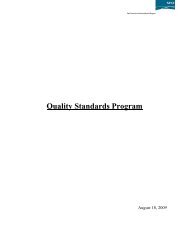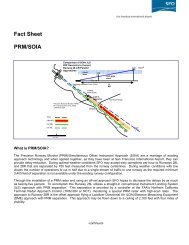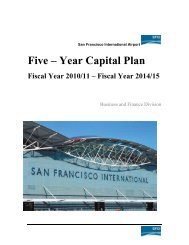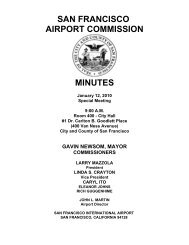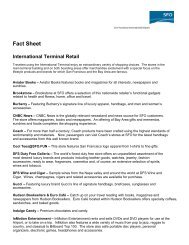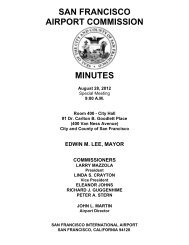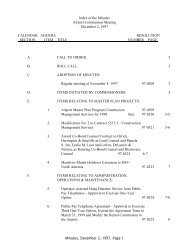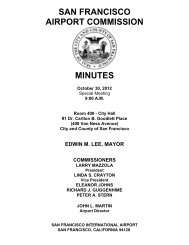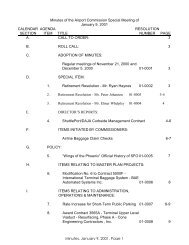Official Statement Airport Commission City and County of San ...
Official Statement Airport Commission City and County of San ...
Official Statement Airport Commission City and County of San ...
Create successful ePaper yourself
Turn your PDF publications into a flip-book with our unique Google optimized e-Paper software.
Under the United States Bankruptcy Code, any rejection <strong>of</strong> a lease could result in a claim by the<br />
<strong>Commission</strong> for lease rejection damages against the airline estate in addition to pre-bankruptcy amounts owed,<br />
which claim would rank as that <strong>of</strong> a general unsecured creditor <strong>of</strong> such airline. The <strong>Airport</strong> may also have rights to<br />
claim against the faithful performance bond or letter <strong>of</strong> credit required <strong>of</strong> airlines to secure their obligations under<br />
<strong>Airport</strong> agreements or the right to set <strong>of</strong>f against credits owed to the airlines. The airlines generally pay l<strong>and</strong>ing fees<br />
one to two months in arrears based on final reporting data <strong>and</strong> the st<strong>and</strong>ard billing practices <strong>of</strong> the <strong>Airport</strong>. There<br />
can be no assurance that all such amounts could be collected if a Signatory Airline rejects its Lease Agreement in<br />
connection with a bankruptcy proceeding. In addition, the <strong>Commission</strong> may be required to repay l<strong>and</strong>ing fees <strong>and</strong><br />
terminal rentals paid by the airline up to 90 days prior to the date <strong>of</strong> the bankruptcy filing.<br />
Even if a bankruptcy debtor airline assumes its lease while in Chapter 11, a bankruptcy trustee could reject<br />
the assumed lease if the case were subsequently converted to a case under Chapter 7 <strong>of</strong> the bankruptcy code<br />
(liquidation). The <strong>Commission</strong>’s claim against the bankruptcy estate would be an administrative claim limited to all<br />
sums due under the lease for the two year period following the later <strong>of</strong> the rejection date or the date <strong>of</strong> the actual<br />
turnover <strong>of</strong> the premises. Any excess rent amounts due under the lease would be treated as a general unsecured<br />
claim limited to the greater <strong>of</strong> one year <strong>of</strong> rent reserved under the lease or 15% <strong>of</strong> the rent for the remaining lease<br />
term, not to exceed three years <strong>of</strong> rent.<br />
Certain Federal <strong>and</strong> State Laws <strong>and</strong> Regulations<br />
Federal Law Prohibiting Revenue Diversion<br />
Federal law requires that all revenues generated by a public airport be expended for the capital or operating<br />
costs <strong>of</strong> the airport, the local airport system, or other local facilities which are owned or operated by the airport<br />
owner or operator <strong>and</strong> directly <strong>and</strong> substantially related to the air transportation <strong>of</strong> passengers or property. In<br />
February 1999, the FAA adopted its “Policies <strong>and</strong> Procedures Concerning the Use <strong>of</strong> <strong>Airport</strong> Revenue” (the “Final<br />
Policy”) clarifying the application <strong>of</strong> these principles to airport sponsors that receive federal grants for airport<br />
development from the FAA, including the <strong>Airport</strong>. The <strong>City</strong> is the “sponsor” <strong>of</strong> the <strong>Airport</strong> for purposes <strong>of</strong> these<br />
federal requirements.<br />
Examples <strong>of</strong> unlawful revenue diversion include using airport revenues for: (1) l<strong>and</strong> rental to, or use <strong>of</strong><br />
l<strong>and</strong> by, the sponsor for non-aeronautical purposes at less than the fair market rate; (2) impact fees assessed by any<br />
governmental body that exceed the value <strong>of</strong> services or facilities provided to the airport; or (3) direct subsidy <strong>of</strong> air<br />
carrier operations. An otherwise unlawful revenue diversion may be “gr<strong>and</strong>fathered” if such use was instituted<br />
pursuant to a law controlling financing by the airport owner or operator, or a covenant or assurance in a debt<br />
obligation issued by the airport owner prior to September 1982. The Final Policy acknowledges that the<br />
<strong>Commission</strong>’s Annual Service Payment to the <strong>City</strong>’s General Fund is “gr<strong>and</strong>fathered” as a lawful revenue diversion.<br />
The <strong>Commission</strong> makes substantial payments to the <strong>City</strong>, separate from <strong>and</strong> in addition to its Annual<br />
Service Payment, for services provided to the <strong>Airport</strong> by other <strong>City</strong> departments. The FAA has authority to audit the<br />
payments <strong>and</strong> to order the <strong>City</strong> to reimburse the <strong>Airport</strong> for any improper payments made to the <strong>City</strong>. The FAA<br />
may also suspend or terminate pending FAA grants to the <strong>Airport</strong> <strong>and</strong>/or any then-existing PFC (as defined below)<br />
authorizations as a penalty for any violation <strong>of</strong> the revenue diversion rules. In addition, the U.S. DOT may also<br />
withhold non-aviation federal funds that would otherwise be made available to the <strong>City</strong> as a penalty for violation <strong>of</strong><br />
the revenue diversion rules (for example, grants to the <strong>City</strong>’s municipal railway system). See also “AIRPORT’S<br />
FINANCIAL AND RELATED INFORMATION–Payments to the <strong>City</strong>.”<br />
State Tidel<strong>and</strong>s Trusts<br />
A substantial portion <strong>of</strong> the l<strong>and</strong> on which the <strong>Airport</strong>’s facilities are located is held in trust by the <strong>City</strong> <strong>and</strong><br />
administered by the <strong>Commission</strong> pursuant to tidel<strong>and</strong>s grants from the State. These grants, accomplished by special<br />
State legislation, date to 1943 <strong>and</strong> 1947. Generally, the use <strong>of</strong> this l<strong>and</strong> is limited to <strong>Airport</strong> purposes under the<br />
terms <strong>of</strong> the grants. The <strong>Commission</strong> may not transfer any <strong>of</strong> this l<strong>and</strong>, nor lease it for periods <strong>of</strong> more than<br />
50 years. There are also certain limitations on the use <strong>of</strong> funds generated from facilities located on this l<strong>and</strong>.<br />
However, none <strong>of</strong> the various restrictions is expected to affect the operations or finances <strong>of</strong> the <strong>Airport</strong>. The grants<br />
may be subject to amendment or revocation by the State legislature, as grantor <strong>of</strong> the trust <strong>and</strong> as representative <strong>of</strong><br />
61



